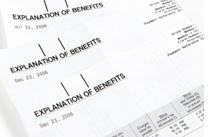Coming up in the first week of August, we will join others in celebrating Simplify Your Life Week. Join us on our EasyLiving Facebook page for daily tips to make life simpler (and share yours)!
When a person has multiple medical conditions or a chronic disease, paperwork really piles up and dealing with medical bills, records and correspondence becomes a big part of life. Caregivers often find themselves spending a lot of time dealing with mail, bill paying and contacting insurance companies or providers.
Our patient advocates are experts at dealing with this type of red tape. Today, we’ll share some of their tips to simplify and spend less time (and hassle) on paperwork.
- Start by getting organized with a system. This will help you easily access what you need at any time. Create a logical filing method and consider using an online system. There are great caregiver systems and electronic medical/personal record systems that allow you to store key information and have the details that providers will need, which will reduce errors and future problems. We use Caregivers Touch for our clients and you can read our review about choosing an electronic personal health records system.
- Make sure you have the key documents and information you need. Check out our Document Locator list for an idea of some of the most important financial/life documents (if you are healthy right now and mange everything on your own, let your designated representative know where to find these documents at least). In addition, you should keep a medical record that includes information such as: medical providers and contact information (plus specialty/what they are treating you for), diagnoses (and when diagnosed), medications (including allergies and medications that did not work or caused significant side effects, surgeries/medical history, immediate family history, allergies, and current treatments. Many people have not kept track of this information over the years and caregivers may find it hard to piece together a history and current picture. If you need help, our care management assessment can solve this issue for you!
- Keep good records so you can respond effectively to inquiries, bills, etc. The more information you have, the better you can identify errors and provide needed information to keep billing accurate and ensure better insurance coverage, etc.
- Know what to disregard, and prioritize. Learn to distinguish between bills and explanation of benefits/statements. Or, hire a patient advocate to help you on a regular basis to simplify and get you the best results. This may also allow you more time with your loved one and a better ability to balance. Some tasks are best delegated. Also, during a crisis, it is okay to let some things slip. You will never regret the time you spent by your loved one’s bedside, but you might regret spending time away from him/her to deal with paperwork or call the insurance company.
Need help? Our patient advocates are here to assist with anything from a comprehensive assessment and creating an organized caregiving system to advocating with Medicare, insurance companies and medical providers. Call us at 727-447-5845 for a free needs analysis and caregiver tips today!


 Popular Downloads
Popular Downloads


 Get Our Newsletter!
Get Our Newsletter! Mission Statement
Mission Statement

